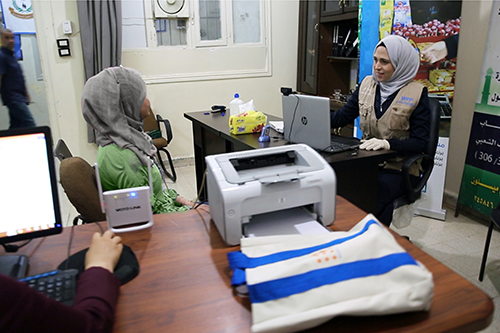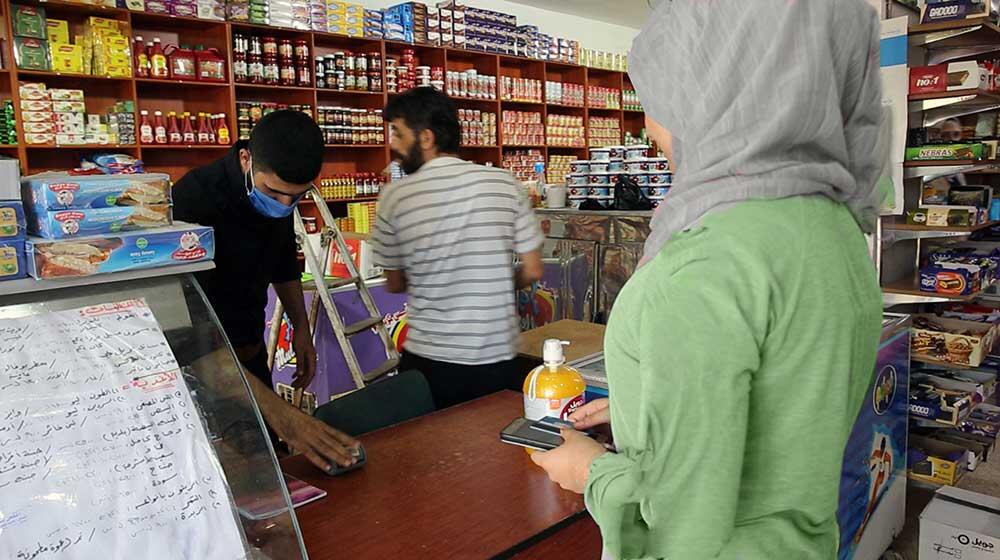DAMASCUS, Syria – In Syria, communities are struggling under the weight of the prolonged war, an escalating economic crisis and the COVID-19 pandemic. More than 11 million people across the country are in need of humanitarian support.
The pandemic arrived in Syria at the end of March. So far, more than 4,000 cases of COVID-19 have been confirmed, according to the World Health Organization, with densely populated areas, camps and informal settlements considered areas of particular concern.
Meanwhile, rapid depreciation of Syria’s currency and skyrocketing food prices are plunging people into poverty. Between December 2019 and June 2020, the national average food basket cost had increased by 153 per cent.
“The prices have increased significantly in the last two months and that the financial situation is so challenging,” Khadija, 21, told UNFPA partners last week. “We can’t purchase to fulfill our family's needs compared to the previous months.”

A woman receives support from a UNFPA-supported centre. © UNFPA Syria
Vouchers for food, sanitizers
The nine-year-long conflict in Syria has stretched livelihoods and services to the breaking point. Millions of displaced people were already struggling to meet their basic needs. Now, with the pandemic, families additionally require soap and sanitizing supplies to protect themselves from illness.
In response, UNFPA and the World Food Programme (WFP) are scaling-up an electronic voucher system that targets pregnant and breastfeeding women, who have heightened nutritional requirements.
The e-voucher system helps women purchase food and hygiene items from designated stores in Aleppo, Damascus, Dara’a, Deir Ez-Zor, Hama, Hassakeh, Homs, Lattakia, Quneitra, Raqqa, rural Damascus and Tartous.
It aims to reach an additional 70,000 extremely vulnerable families.
The initiative, based on a successful pilot programme UNFPA and WFP implemented in Dara’a, could potentially expand to further affected areas as well.
Khadija, who has a 1-month-old daughter, says detergents and soaps have been particularly difficult to obtain, though she has recently been able to purchase them with through e-voucher system.
The savings have enabled her family to visit the doctor and meet other essential needs, she said.

The system is intended to allow families to access a range of food and hygiene items in a single trip. © UNFPA Syria
Reducing COVID-19 risks
“The COVID-19 pandemic has, in many ways, affected the health and socio-economic well-being of vulnerable women around the world, including in Syria,” said Karen Daduryan, UNFPA’s Representative in Syria.
Families reached with the voucher system say they are now able to choose from a range of nutritious food items and hygiene products, including sanitary napkins, soap, shampoo and other detergents. It also helps families buy most of the critical items they need in a single trip, thereby limiting their exposure to COVID-19.
UNFPA is also distributing hygiene kits to pregnant and breastfeeding women, reaching an estimated 2,000 people.
These kits contain essential hygiene supplies that have been the subject of “urgent requests” due to “the great need for it and the high prices for it, especially diapers,” explained Ms. Shams, who registers pregnant women and new mothers for aid through the Al Ber Association.
She added that she hopes to see this kind of support increase as the prices continue to rise.


